Search Results
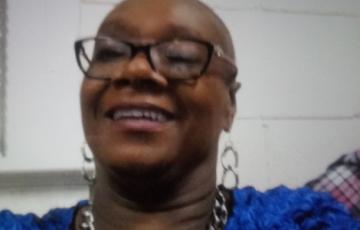
Catherine
I was diagnosed in December 2013 with blood cancer. I started my treatment in January 2014. I continued treatment until March 2018 until I had a Bone Marrow Transplant at Duke Medical Center.
I worked every day until it was time to take FMLA. I was out of work for 8 weeks. It's been 2 yrs 8 months. I'm CANCER FREE and I'm in REMISSION. I can't thank the physicians, and the team and God. I've retired after 22 years working for Mecklenburg County.
I received my last shots in October, and I rung the "Victory Bell" at the Levine Cancer Institute in Charlotte, NC.
Holly
It felt just like any other Saturday after my dad's birthday. He got his annual checkup and bloodwork, and we would all celebrate our April birthdays around Easter Sunday. But this turned into something unlike any other Saturday. His cell phone rang, and everything changed. He was told to go to the ER immediately because something was wrong with his bloodwork, specifically his red and white blood cells.It could have been the shock of feeling everything all at once and being numb simultaneously.
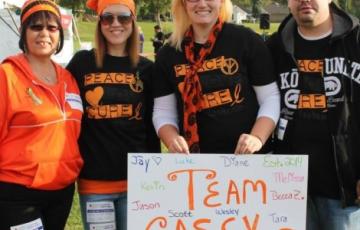
Casey
It was in May, 2014 that 24-year-old Casey Moore began experiencing her first symptoms of chronic myeloid leukemia (CML). For a week straight, Casey had been vomiting every day and was losing a significant amount of weight. This was unusual, as prior to her symptoms, she considered herself a happy, healthy woman focused on her relationship and career. At the time, she was living with her boyfriend and working full time in a chiropractic office -- with no apparent signs of an illness.

Jaden
My name is Jaden, and I am an 18-year-old Political Science student at Penn State University. I have been deeply involved with The Leukemia & Lymphoma Society (LLS) since I was 10 years old, a journey that began with a profound personal experience.
Eliot
It was my senior year of high school, and I was thriving: MVP of the soccer team that went to the state finals; strong academics with an offer to study Natural Sciences at Durham University, one of England’s finest; fantastic friends who were to become even more important to me. My biggest challenge was getting a date for the prom! Things that were within my control were going really well. However, things outside of my control then flexed their powerful muscles, and that high school life ended and a new one began.
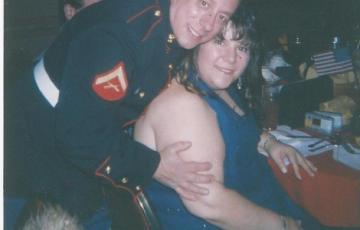
Lisa
I lost my big brother Vincent J. Di Cristo to two forms of cancer on February 14, 2014. He apparently had both high grade B-cell non-Hodgkin lymphoma as well as Burkitt lymphoma. I’m very confused as to how he could have had two different types of cancer because as far as I know, he was always in good health.
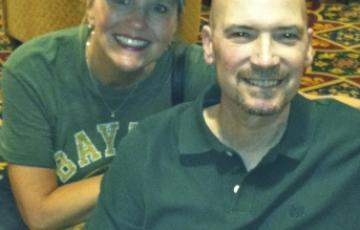
Janet
My caregiver journey began in 2005, when my husband found a lump on his neck and was diagnosed with a rare form of non-Hodgkin lymphoma. After being admitted to the hospital for nine rounds of chemotherapy, he went into remission.
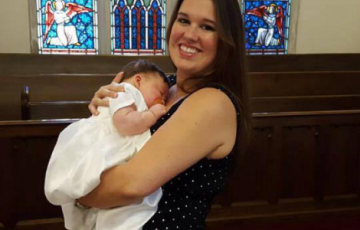
Katie
Ten days following the birth of my son in May, I developed a mass on my upper left thigh/groin area. After several weeks of being seen by multiple physicians, it was decided that I would need a surgical biopsy to determine if we were dealing with cancer or a benign growth.

David
My dad, David, was diagnosed with acute lymphoblastic leukemia (ALL) on March 1, 1993, after looking at his blood under a microscope in college class. He started three years of intense chemotherapy on March 8, 1993, and finished it on January 26, 1996, while a third-year medical student. He was told that there was a 50% survival at five years and 30% survival at 10 years and that he would likely not be able to have children. During that time, he got married. Two years after finishing chemo, my oldest brother was born. I have three older brothers and an older sister.

Christopher
Christopher was diagnosed with acute lymphoblastic leukemia (ALL) on July 9, 2012 when he was 10 years old. After feeling tired and experiencing bone pain and headaches for three weeks, he went to the doctor. A requested blood test revealed leukemia cells.

Krystina
On June 13, 2014, my sweet daughter Krystina Sharpe Perry was diagnosed with PH positive acute lymphoblastic leukemia. Unfortunately, all her chemotherapy treatments didn't seem to work.
After a year of chemotherapy, Krystina and her doctor decided to do a stem cell (umbilical cord blood) transplant. She had the procedure on July 1, 2015 but her body couldn't fight the infections. With a low immune system and three trips to the intensive care unit, her kidneys, lungs and heart just couldn't continue to function.

Kate
On May 17, 2018, our family was thrown into the world of blood cancer. Our family's patriarch, our bonus dad, and our beloved "Candy Boy," as he was affectionately nicknamed by his youngest daughter, found out that he was in the aggressive stages of acute myeloid leukemia (AML).

Liam
One of the Boston Bruin’s biggest fans, Liam Fitzgerald garnered national recognition as the “fist bump kid” and went on to raise almost $153,000 for The Leukemia & Lymphoma Society (LLS) to help fight blood cancers.
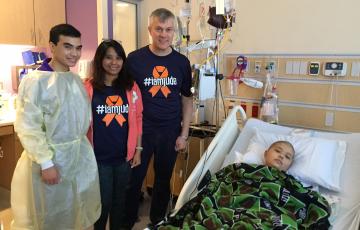
Jude
At age five, on my fourth day of kindergarten, I was diagnosed with acute lymphoblastic leukemia (ALL). With the 85% survival rate for ALL, I was confident I would go through this for the next three years but one month later after the induction period, my doctor told us I didn’t respond and I may need a bone marrow transplant.

Nicole
I’m an eight-year survivor of leukemia. I was a happy, healthy young adult. I noticed my body was bruising, and I would fall asleep at work. I didn’t think anything of it, but the bruising kept coming. I have twin girls, and on their birthday, July 1, I went to the ER. They ran all kinds of tests. I felt fine actually. They came back and were talking about white blood counts and oncologists. I knew right then and there it was cancer. I had an appointment with an oncologist on July 5, my mom’s birthday, and went back to the ER. This time I was admitted. I had no idea what was going on.

Cathy
I decided to call my cancer the “little c” rather than the “Big C.” I wasn't giving it that much power over my life!

Bill
My name is Bill Bannon. I am a semi-retired child support magistrate for the Minnesota State Courts. In April 2017 I experienced shortness of breath, a sore-throat and bleeding gums. I was diagnosed with acute myeloid leukemia (AML), was stabilized, and started on intensive chemotherapy. It was soon learned that I had a FLT-3 mutation of this cancer, the most serious and difficult to treat. The only possibility for any chance at survival was a bone marrow or umbilical stem cell transplant (BMT). I chose to continue my treatment at the University of Minnesota.
Childhood and Young Adult Resources
On this Page:
Resources for Children, Young Adults and ParentsOne-on-One Support
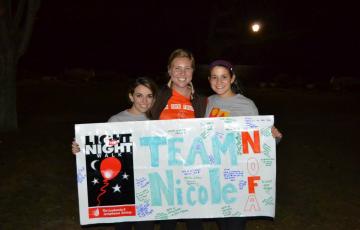
Nicole
Just two weeks into my junior year of high school, I was pulled out of class at lunch and packed a small overnight bag, not realizing I wouldn’t return to school for the entire year.
My name is Nicole, and in 2022, I celebrated the 10-year anniversary of that life-altering day.

Anna
As many of you know, in 2015 our daughter Anna was diagnosed with acute lymphoblastic leukemia (ALL). She had a very successful treatment, and God answered my wife and my prayers. As of March 2023, Anna has been cancer-free for five years making her a cancer survivor. On October 21, Aimie, Anna, and I will participate in the Light The Night (LTN) walk for The Leukemia & Lymphoma Society (LLS). Funds raised through LTN allow LLS to fund treatments for patients who have blood cancer. As you can imagine, this cause is very special to Aimie and me.
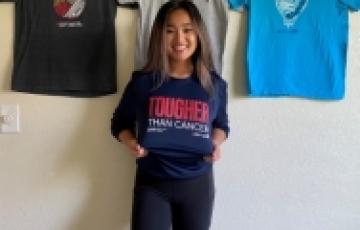
Starlet
When I was born, I was healthy and hardly ever got sick. Well, when I turned one, I had fevers that would come and go and then my mom started to notice I would limp and bruise easily. My mom decided to take me to the hospital after a persistent fever and the limping and bruising got worse. The doctors then referred us to Valley Children’s where they did blood work on me.
After the results came in my parents heard the words no one ever wants to hear: their one-year-old daughter is now diagnosed with acute myeloid leukemia (AML).

Beth
Shortly after Thanksgiving of 2008, I started feeling sick and extremely weak. By late January of 2009, I was diagnosed with stage IV aggressive Burkitt’s lymphoma.

Rob
I have this thing inside me called chronic myelomonocytic leukemia (CMML). It’s a rare form of leukemia that affects the blood and bone marrow. Only 1,100 cases are diagnosed a year in the U.S. Four out of a million. I do not want to be that special.
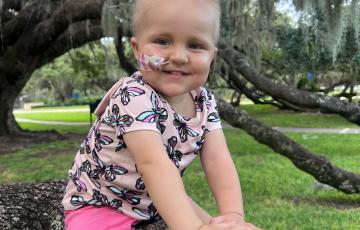
Aila
Aila was diagnosed with acute myeloid leukemia (AML) on October 5, 2023. She was nearly 16 months old and was just getting used to being a walking toddler and enjoying the exploration of her world. Aila had been feeling sick for a few weeks before she was diagnosed. She had fevers, irritability, fatigue, sleeping long hours, and a decreased appetite. In the last several days before she was diagnosed, she started getting unexplained bruising and petechiae (broken blood vessels) all over her body.
